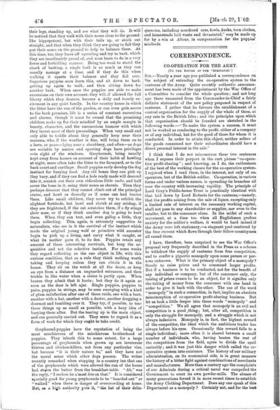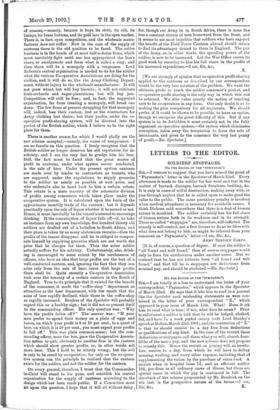CORRESPONDENCE.
CO-OPERATION FOR THE ARMY.
[TO TEE EDITOR OF THE "SPECTATOR-1
SIR,—Nearly a year ago you published a correspondence on the subject of extending the co-operative system to the canteens of the Army. Quite recently authentic announce- ment has been made of the appointment by the War Office of a Committee to consider the whole question ; and not long ago there emanated from the Commander-in-Chief a fairly definite statement of the new policy proposed in respect of canteens. I gather that he favours the establishment of a central organisation for the supply of the whole of them, at any rate in the British Isles ; and the principles upon which that organisation should be founded are sketched in the following words :—" To make the system a success, it must not be worked as conducing to the profit, either of a company or of any individual, but for the good of those for whom it is conducted. In order to attain this object, neither sellers of the goods consumed nor their subordinates should have a direct personal interest in the sale."
I think that I do not misconstrue these two sentences when I express their purport in the curt phrase "co-opera- tive profit-sharing " ; and knowing, as I do, the enthusiasm of the best of the working classes for the co-operative system. I rejoiced when I read them, in the interest, not only of co. operators, but of the British soldier. Co-operation, in various forma and under various names, is spreading its branches all over the country with increasing rapidity. The principle of Lord Grey's Public-house Trust is practically identical with that laid down by Lord Roberts for the canteens,—namely, that the profits arising from the sale of liquor, excepting only a limited rate of interest on the necessary working capital, shall not pass to any shareholder or supplier, nor even to the retailer, but to the consumer alone. In the midst of such a movement, at a time too when all Englishmen profess anxiety for the soldier's welfare, it would be hard indeed if the Army were left stationary,—a stagnant pool unstirred by the free current which flows through their fellow-countrymen all round them.
I have, therefore, been surprised to see the War Office's proposal very frequently described in the Press as a scheme to withdraw the supply of canteens from free competition, and to confer a gigantic monopoly upon some person or per- sons unknown. What is the primary object of a monopoly ? Surely to raise prices and to command larger profits. But if a business is to be conducted, not for the benefit of any individual or company, but of the consumer only, the raising of prices ceases to be an object, for it signifies only the taking of money from the consumer with one hand in order to give it back with the other. The use of the word " monopoly " in such a connection, in fact; implies an absolute misconception of co-operative profit-sharing business. But let us look a little deeper into these words " monopoly " and " competition." We all agree that monopoly is an evil and competition is a good thing; but, after all, competition is only the struggle for monopoly, and a struggle which is not always indecisive. Monopoly is, in fact, the highest reward of the competitor, the ideal which' the ambitious trader has always before his eyes. Occasionally this reward falls to a single individual ; more often it is shared between a small number of individuals, who, having beaten the rest of the competitors from the field, agree to divide the spoil amicably ; and it was just this danger which called the co- operative system into existence. The history of our military administration, on its economical side, is in great measure the history of a bitter fight against combinations of merchants and manufacturers. More than a century ago the complaints of our Admirals during a critical naval war compelled the Government to erect its own powder-mills. The abuses of many generations forced it in more recent times to establish the Army Clothing Department. Does any one speak of this Department as a monopoly ? Certainly not, and for the best of-reasons,—namely, because it buys its cloth, its silk, its linings, its brass buttons; and its gold lace in the. open market. There is, in fact, open competition, and the wholesale manu- facturer does not suffer. Now in the case of the supply of canteens there is the old position to be faced. The entire business is in the hands of at most half-a-dozen firms, which must inevitably fight until one has appropriated the lion's share, or amalgamate and form what is called a ring ; and then there will be a monopoly with a vengeance. Lord Roberts's central organisation is needed to do for the soldier what the various Co-operative Associations are doing for the civilian, and it will do so, like the Army Clothing Depart- ment, without injury to the wholesale manufacturer. It will not grow wheat, but will buy biscuits ; it will not cultivate fruit-orchards and sugar-plantations, but will buy jam. Competition will still be free ; and, in fact, the suggested organisation, far from creating a monopoly, will break one down. The few firms at present struggling for that monopoly will, indeed, lose their custom, just as the contractors for Army clothing lost theirs ; but their profits, under the co- operative profit-sharing system, will be diverted into the pocket of the British soldier, which I believe to be the right place for them.
There is another reason for which I would gladly see the new scheme accepted,—namely, the cause of temperance. I am no fanatic on this question. I freely recognise that the British soldier no longer deserves his old reputation for in- sobriety, and I am the very last to grudge him his beer. Still, the fact must be faced that the great source of profit in canteens, under what system soever conducted, is the sale of beer. Under the present system canteens are made over by tender to contractors as tenants, who are supposed, under the regulations, to supply groceries to the soldier as nearly as possible at cost price, and who undertake also to hand back to him a certain rebate. This rebate is a mere travesty of the automatic division of profits among consumers which takes place under the co-operative system. It is calculated upon the basis of the approximate monthly trade of the canteen ; but it depends practically upon the sale of liquor whether it be earned or not. Hence, it must inevitably be the tenant's interest to encourage drinking. If the consumption of liquor falls off—if, to take an instance from my own knowledge, five hundred thirsty old soldiers are drafted out of a battalion to South Africa, and their place is taken by as many abstemious recruits—then the profits of the tenant disappear, and he is obliged to compen- sate himself by supplying groceries which are not worth the price that he charges for them. Thus the sober soldier actually suffers for his sobriety. Unfortunately, also, drink- ing is encouraged to some extent by the carelessness of officers, who have an idea that large profits are the test of a well-conducted canteen, and, ignoring the fact that they can arise only from the sale of beer, insist that large profits there shall be. Quite recently a Co-operative Association took over the tenancy of a certain canteen in the South of England. True to its principle that it existed for the benefit of the consumer, it made the " coffee-shop " department as attractive as the beer department, with the result that the sales of beer rapidly declined, while those in the coffee-shop as rapidly increased. Readers of the Spectator will probably regard this as a healthy sign ; but it did.not so present itself to the commanding officer. His only question was : " Why have the profits fallen off ? " The answer was : " If your men prefer to spend their money on a plate of eggs and bacon, on which your profit is 8 or 10 per cent., to a quart of beer, on which it is 50 per cent., you must expect your profits to fall off." This was plain common-sense ; but the com- manding officer, none the leas, gave the Co-operative Associa- tion notice to quit, obviously to another firm in the canteen which should show greater profits, or, in other words, sell more beer. This I hold to be utterly wrong ; but the evil is only to be cured by co-operation, for only on the co-opera- tive system can the principle be realised that the canteen exists for the soldier, and not the soldier for the canteen.
. On every ground, therefore, I trust that the Commander. in-Chief will stand to his guns, and establish his central organisation for the supply of canteens according to the design which has been made public. If a Committee must sit upon the question, I hope that it will sit without delay ;
for, though our Army be in South Africa, there is none the less a constant stream of men homeward from the front, and it seems to me most impolitic that soldiers who have enjoyed the benefit of the Field Force Canteen abroad should return to find its advantages denied to them in England. The pay of the Army, or, in other words, the spending power of the soldier, is now to be increased. Let the War Office crown its good work by ensuring to him his full share in the profits of his increased expenditure.—I am, Sir, &c.,
X.
[We are strongly of opinion that co-operative profit-sharing applied to the canteens as described by our correspondent would be the very best solution of the problem. We want the ultimate profit to reach the soldier consumer's pocket, and co-operative profit-sharing is the only way in which this can be achieved. We also value greatly the notion of teaching men to be co-operators in any form. Our only doubt is as to making the plan compulsory for all regiments. We should prefer, if it could be shown to be possible, to leave an option, though we recognise the great difficulty of this. But if any system is to be forbidden it must certainly not be the fully organised co-operative system,—the system which eliminates corruption, takes away the temptation to force the sale of intoxicants, and gives to the consumer the very last penny of profit. —En. Spectator.]







































 Previous page
Previous page